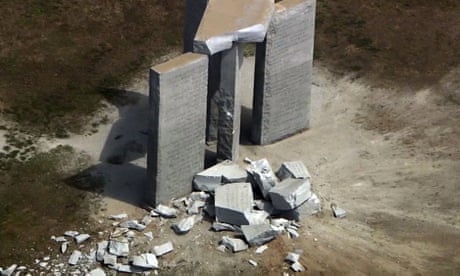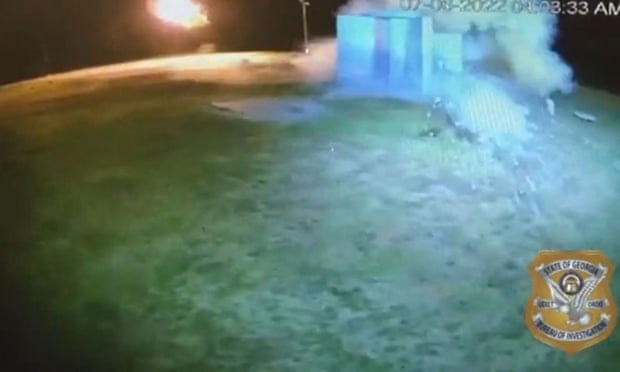Granite megaliths with cryptic inscriptions drew 20,000 visitors a year and inspired a Yoko Ono song but riled some on far right

Coral Murphy Marcos and Chris MichaelThu 7 Jul 2022 20.18 BST
Aday after vandals destroyed the controversial monument in Georgia dubbed “America’s Stonehenge” and considered “satanic” by some members of the far right, questions continue to swirl about how it became a flashpoint for violence.

The Georgia bureau of investigation, which is dealing with the case along with the Elbert county sheriff’s office, said that unknown individuals detonated an explosive device at the Georgia Guidestones granite monument in Elberton at around 4am on Wednesday, destroying a large part of the structure.
The 19ft monument was later completely demolished by local authorities for safety reasons. No one was injured during the incident.
The state’s explosive ordnance disposal unit is conducting an investigation of the site, and investigators released surveillance video that showed the explosion as well as a car speeding away shortly afterward.
The structure, which was built in 1979, had long drawn curious visitors from around the world because of its unique design and cryptic messages. It was made of six granite slabs – a central monolith flanked by four others and topped with a capstone – weighing a total of more than 100 tonnes. Holes in the pillars were aligned with the Pole Star and the Sun’s solstice and equinox, and one aperture allowed a ray of sun to pass through at noon each day to indicate the day of the year.

On it were also inscribed 10 elliptical messages in several languages, including Spanish, Russian and Hebrew. They included “Maintain humanity under 500 million in perpetual balance with nature” and “Balance personal rights with social duties”.
The somewhat bizarre precepts sparked a certain esoteric interest. In 1993, Yoko Ono wrote a song called Georgia Stone for a John Cage tribute album in which she paraphrased the 10th message in a chant, “Be not a cancer on Earth – leave room for nature – leave room for nature”.
It also attracted controversy, notably from the former Republican candidate for governor Kandiss Taylor, who called it “satanic” and campaigned on a promise to obliterate it.
On Wednesday, Taylor suggested the vandalism was an act of God. “God is God all by Himself. He can do ANYTHING He wants to do. That includes striking down Satanic Guidestones,” she tweeted.
The structure already had a history of being vandalized, said Christopher Kubas, executive vice-president of the Elberton Granite Association.
“Some people didn’t like the wording that was on it,” Kubas said. “But there were a lot of people that enjoyed the monument, and were able to look past the wording and see it for what it was: as a really immense granite structure and basically as a work of art.”
The Elbert County Chamber of Commerce calls it “probably the most unusual monument ever produced in the Elberton area”, in part because of its origins: it was built by a man going by the pseudonym Robert C Christian, who approached the Elbert Granite Finishing Company to build a monument intended to “leave a message for future generations”.

Christian said he represented a “small group of loyal Americans who believe in God” and who preferred to remain anonymous. He claimed to have revealed his real name to the president of the Granite City Bank, which held the group’s money until the Georgia Guidestones were completed and said it would not reveal his real identity.
“I thought it was totally crazy and didn’t make any sense,” said Tom Oglesby, who was president of the Elberton Granite Association when the structure was built, in a 2012 documentary about the Georgia Guidestones. “The story behind it was what never really made sense.”
It certainly helped attract tourists: more than 20,000 visited every year, according to Kubas; many residents believe the structure was only made to attract tourists.
Others, however, claimed to have seen individuals in hooded robes visiting the monument late at night, and there were reports of animal carcasses in the area.
“Whatever your personal opinion on the Guidestones is, this attack is bad for our community,” the Elbert County Chamber of Commerce said in a Facebook post. “We hope that whomever [sic] is responsible is apprehended and brought to justice.”
… as you’re joining us today from Germany, we have a small favour to ask. Tens of millions have placed their trust in the Guardian’s fearless journalism since we started publishing 200 years ago, turning to us in moments of crisis, uncertainty, solidarity and hope. More than 1.5 million supporters, from 180 countries, now power us financially – keeping us open to all, and fiercely independent.
Unlike many others, the Guardian has no shareholders and no billionaire owner. Just the determination and passion to deliver high-impact global reporting, always free from commercial or political influence. Reporting like this is vital for democracy, for fairness and to demand better from the powerful.
And we provide all this for free, for everyone to read. We do this because we believe in information equality. Greater numbers of people can keep track of the events shaping our world, understand their impact on people and communities, and become inspired to take meaningful action. Millions can benefit from open access to quality, truthful news, regardless of their ability to pay for it.
Every contribution, however big or small, powers our journalism and
